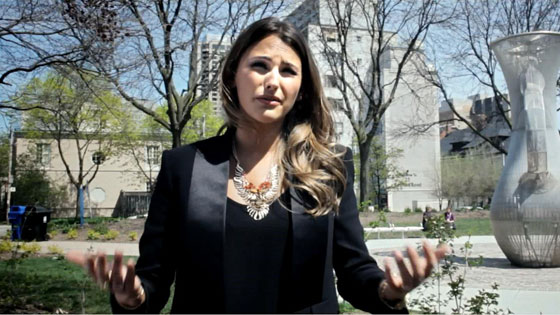
Yael Cohen explains uncomfortable cancer warning signs in A Day Without Cancer. (Photo: Joseph Nanni/FRANK Content).
On April 2, 2014, the world premiere of
A Day Without Cancer was held at Isabel Bader Theatre, supported by The Princess Margaret Cancer Foundation in Toronto.
Directed by Joseph Nanni and narrated by acclaimed musician Bryan Adams, the documentary demystifies the subject of cancer and provides an overview of progress in cancer research.
While health professionals, documentary enthusiasts, and philanthropists flocked to the premiere, the event was also attended by young, educated professionals with various degrees of cancer knowledge.
A recent article in the
Toronto Star acknowledged that young adults are often not the focus of cancer research and awareness.
A Day Without Cancer makes the effort to touch upon the young adult experience with cancer and features Yael Cohen, 27, CEO of F*** Cancer. Cohen is recognized as an advocate who resonates with the younger generation.
"[Cancer is] a very complex problem that we have trivialized and miniaturized to make digestible to the general public," said Cohen during an interview for the film.
A Day Without Cancer covers the history of cancer and heavily emphasizes the patient experience; the following points are what registered the most with some of the young professionals who attended the world premiere.
Hearing the word "cancer" all the time
James Brophy, 22, is a business consultant at a national bank. He confessed that his knowledge of cancer was limited prior to watching the documentary.
"Going into this, I was your typical person who didn't really know much about cancer. You hear the word all the time but you don't really know much about it," said Brophy.
While Brophy had heard cancer statistics in passing, the film faced the young man with an uncomfortable truth.
"It was bad, realizing that it affects so many more people than I initially realized. Younger people think it only affects older generations and that 'it'll never happen to me.' But that's probably what every cancer patient thinks before they know their diagnosis. So this film was sobering in that it makes you realize that cancer doesn't discriminate on age," added Brophy.
Brophy is impressed with the progress that has been made in cancer research and hopes that the documentary will reach wider audiences.
The power of metrics
Peter Langer, 25, is an analyst at a major energy company and says that one of the film's most striking points to him was about cancer prevention.
"The film mentions 50 to 60 per cent of cancers could be avoided with a healthy lifestyle. Before, I obviously knew that it made sense to eat well and to live clean—all that stuff," said Langer. "But how it related to cancer prevention wasn't something I was able to put a metric to. I was really surprised when I realized how many cancers are caused by an unhealthy diet, smoking and a lack of exercise."
Langer strongly believes that young professionals respond more to hard numbers.
"I don't think that stat is driven hard enough to young people," added Langer. "I think that this concrete information would really hit home."
Putting a young face on cancer truths
Agata Zieba, 24, is a development officer at a local hospital foundation. Her knowledge of the cancer space, however, was limited prior to
A Day Without Cancer.
"As a young person, you do feel immortal. You don't think it's going to happen to you," said Zieba.
While Langer supports the power of facts and figures, Zieba maintains that a real human face is what will reach her age group.
"I think the most important thing is putting a face on this—you hear statistics but you don't really get the full picture or how it affects people until you hear stories about people who have gone through this terrible disease," said Zieba.
Zibea acknowledges that her age group may not enjoy discussing the subject but that young adults should be aware of their family history and equip themselves with knowledge about their health.
"I think putting younger faces in the film makes you realize that it can happen to you, even if you are doing the right things like following a healthy diet. It can be due to your genetics and that's a reality that a lot of young people have to face."
As a professional in the health sector, Zieba feels confident that sharing personal patient stories like those featured in
A Day Without Cancer will have the greatest impact in her age group.
Engaging young professionals through participation
Frances Mitchell, 25, is an assistant marketing manager at a consumer packaged goods company.
"I wouldn't say that the film put me at ease, but it makes you feel hopeful about what's being done to conquer cancer," said Mitchell.
Mitchell has participated in cancer fundraising campaigns before, but was surprised to learn about the advancements that had been made in cancer research.
"The film talks about achievements from the past 30 years but it's amazing what's been done recently with the funding, even within the last five years," said Mitchell.
"I think it was very well put when [the researchers] said they don't want cancer to be a death sentence anymore. They want to control it and make it something that you live with, like infectious disease. I feel a bit more optimistic now, knowing the amount of work going into cancer research," added Mitchell.
As a young woman with a mind for marketing, Mitchell reasons that young adults prefer participating for awareness rather than raising funds.
"Young people are about participation, coming together for a reason—we're more about generating ideas. We want to feel like we're a part of something and we enjoy being directly involved in promoting a cause."
A Day Without Cancer is scheduled to air on CBC's Documentary Channel later this spring.
To find out more about
A Day Without Cancer, please visit
http://adaywithoutcancer.ca.
